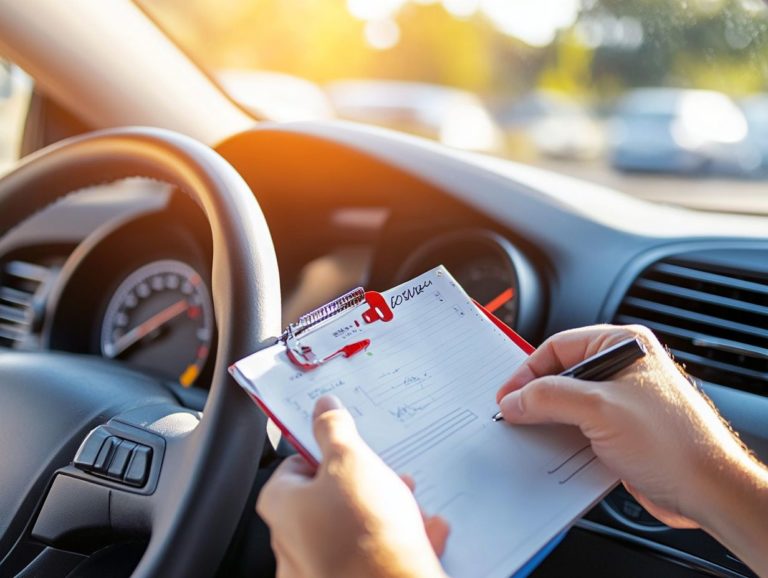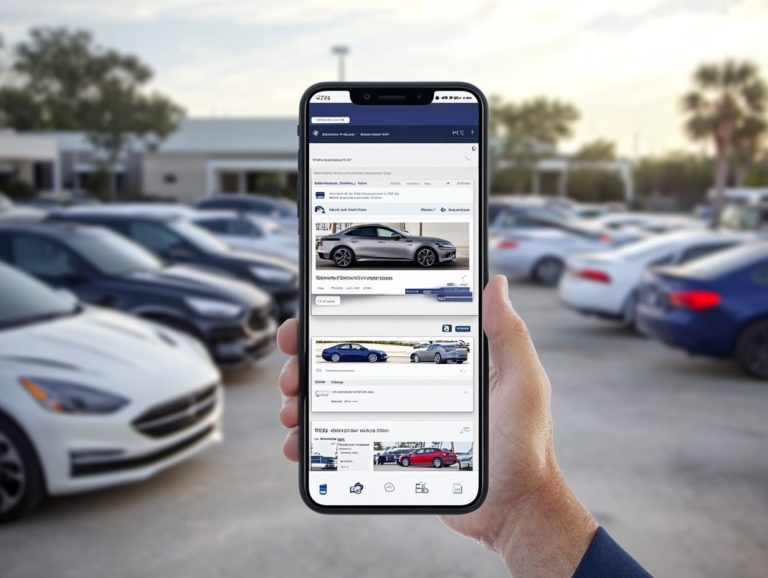5 Must-Have Documents for Buying Used Cars
Buying a used car can be both thrilling and a bit overwhelming, particularly when it comes to ensuring that all the necessary paperwork is in perfect order.
By understanding the essential documents, you can save yourself time, money, and potential headaches down the line. You ll want to gather five must-have documents before finalizing your purchase, from the bill of sale to title transfer papers.
We’ll dive into the significance of each document, what you should specifically look for, and the risks associated with overlooking this crucial step. Get ready to hit the road in your new car with complete confidence!
Contents
- Key Takeaways:
- 1. Bill of Sale
- 2. Vehicle History Report
- 3. Title Transfer Documents
- 4. Maintenance and Repair Records
- 5. Warranty Information
- What to Look for When Reviewing These Documents?
- Frequently Asked Questions
- What Are the 5 Must-Have Documents for Buying Used Cars?
- Why do I need the vehicle title when buying a used car?
- What is a registration certificate and why is it important?
- Is a vehicle history report necessary when buying a used car?
- What is an emission test certificate?
- What is a seller’s disclosure statement and why do I need it?
Key Takeaways:
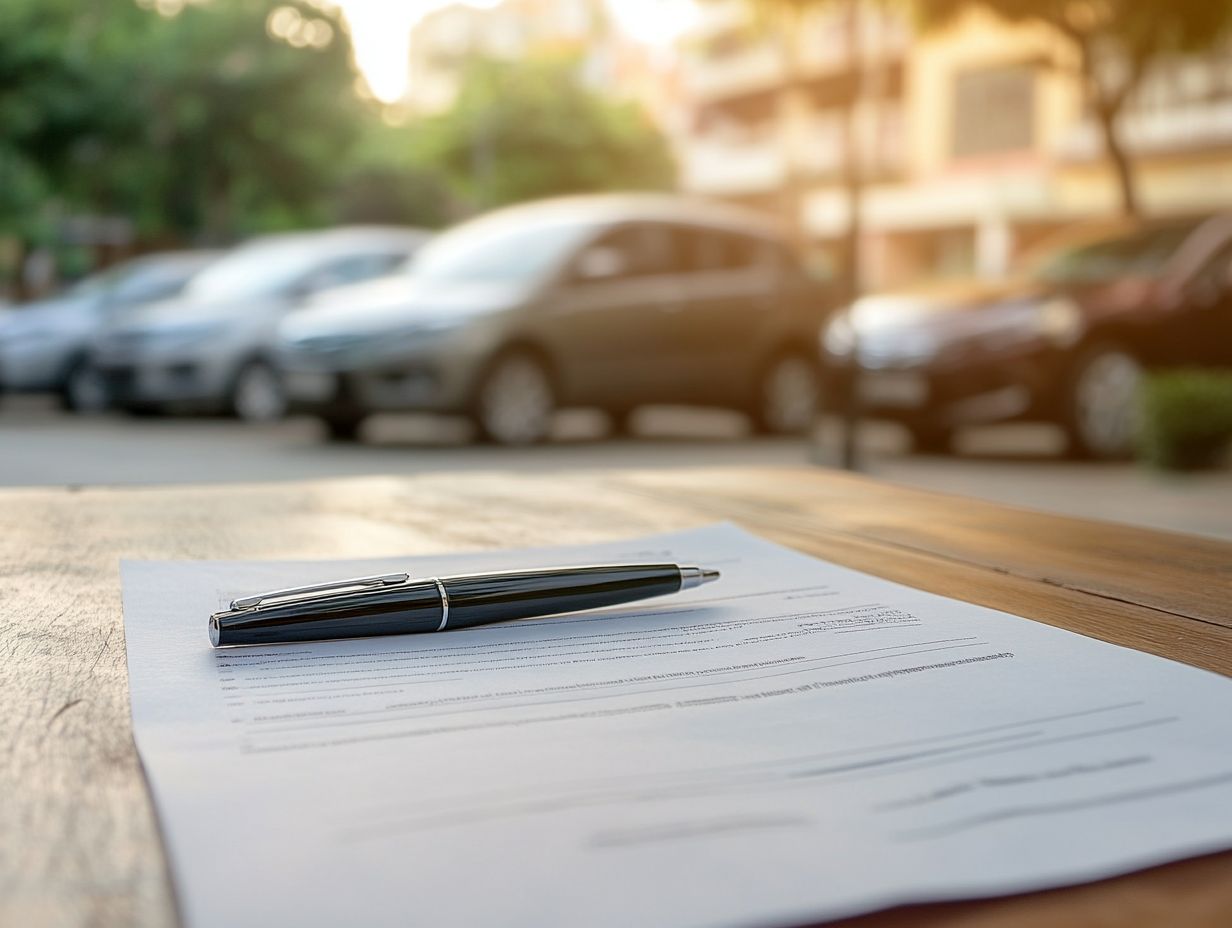
A bill of sale is a necessary document for purchasing a used car and should include important details such as the buyer and seller’s information, vehicle information, and purchase price.
A vehicle history report provides valuable information about a car’s past, including any accidents or damage, and should be reviewed before making a purchase.
Title transfer documents are crucial for legally transferring ownership of a used car and should be properly completed and signed by both parties.
1. Bill of Sale
A Bill of Sale is an essential document in your car purchasing journey. It clearly states the transaction details, including the sale price, vehicle condition, and terms of sale.
This ensures a smooth transfer of ownership and compliance with state regulations mandated by the Minnesota DVS.
This comprehensive document should encompass vital elements such as the full names and addresses of both parties, precise vehicle information including the VIN, and details regarding accepted payment methods be it cash, check, or financing arrangements.
Understanding sales tax can help you avoid unexpected costs that might arise later. Whether you’re involved in a private sale or a transaction through a dealership, a Bill of Sale not only safeguards your rights but also acts as crucial proof of ownership.
This can help alleviate potential disputes and pave the way for smooth dealings in the future.
2. Vehicle History Report
A Vehicle History Report is a critical asset for you as a buyer, offering vital insights into a vehicle’s past. It reveals important details about accidents, title issues, and odometer discrepancies.
This helps you avoid problems with dishonest dealers and ensures the integrity of your car purchase.
You can obtain this report from reputable sources like AutoCheck or PrivateAuto. They provide a treasure trove of information from previous collision details to service history and current warranty coverage.
This allows you to assess a car’s overall condition with thoroughness and precision.
By looking into these details, you can uncover hidden issues that might elude your notice during a simple test drive. Services like Lemon Squad are invaluable during the inspection phase, providing expert evaluations that enhance the insights gained from the history report.
Engaging in this level of meticulous due diligence cultivates a smoother, more trustworthy buying experience.
3. Title Transfer Documents
Title transfer documents are essential for the legal transfer of vehicle ownership. They detail the necessary steps and paperwork required to comply with state regulations, particularly through the Minnesota DVS.
To successfully navigate this process, you need to gather several key documents. The primary item is the vehicle title itself, which must be properly signed over to you as the new owner.
In Minnesota, specific forms like the Application for Title and Registration are crucial, and they may vary depending on the vehicle type or the circumstances of the transaction.
It s also important to be mindful of any sales tax implications that might come into play during the transfer.
Neglecting to complete the correct documentation could lead to ownership disputes or financial penalties. Careful preparation is vital to ensure a smooth transition.
Gathering these key documents not only protects your investment but also makes the car-buying process a breeze, especially when you follow 5 tips for buying used cars from private sellers!
4. Maintenance and Repair Records

Maintenance and repair records are crucial for assessing a vehicle’s condition. They offer invaluable insights into past services, repairs, and any existing service contracts that may influence your car-buying decision.
These records indicate how frequently a vehicle has been serviced. They also highlight any significant repairs or recurring issues that might suggest deeper problems.
By looking into these documents, you can better understand the car’s reliability and upkeep. This understanding ultimately influences its longevity and performance on the road.
Mechanical inspections enhance this knowledge by providing a current evaluation of the vehicle and pinpointing potential future expenses. Sometimes, implied warranties add another layer of protection, safeguarding you from unexpected repairs shortly after your purchase.
5. Warranty Information
Warranty information is essential for you as a car buyer. It clearly outlines the protection level against defects or mechanical failures.
Understanding the differences between dealer warranties, manufacturer warranties, and extended warranties is vital, as these can significantly affect your long-term ownership satisfaction.
Grasping these various options enables you to make informed decisions. Dealer warranties are often more limited, typically covering repairs only at that specific dealership.
On the other hand, manufacturer warranties offer broader coverage against defects for a designated period or mileage. Extended warranties provide additional security but have their own pros and cons.
While they may cover a range of repairs after the manufacturer warranty expires, they can also have high deductibles and specific exclusions. Service contracts and buyer protection plans enhance your purchase experience by offering peace of mind.
These plans cover maintenance services, roadside assistance, and even rental cars during repairs, ensuring that your ownership experience is as enjoyable as possible.
What to Look for When Reviewing These Documents?
When you are reviewing documents related to a vehicle purchase, it’s essential to carefully check every detail. This includes the vehicle history report, bill of sale, warranty information, maintenance records, and 5 things every new car buyer should know, such as title transfer documents.
This careful approach ensures clarity and protection throughout the transaction process. Pay particular attention to the vehicle history report for any red flags like accidents or title issues that could impact its value and safety.
The accuracy of the bill of sale is equally crucial. Any inaccuracies here could lead to disputes down the line.
Warranty documents should clearly outline what s covered and any exclusions, giving you that much-needed peace of mind. Maintenance records serve as a vital timeline of the vehicle’s care, allowing you to assess its reliability effectively.
Conducting thorough inspections to verify the vehicle’s actual condition further safeguards you against unexpected issues. This ultimately paves the way for a smoother transaction experience.
What Are the Risks of Not Having These Documents?
Failing to secure essential documents like a vehicle history report and proper ownership documentation exposes you to significant risks. These include dealer fraud, unexpected mechanical issues, and complications with warranty coverage.
For example, without a vehicle history report, you might unwittingly buy a car that has faced severe accidents or carries a salvage title a designation indicating the car was damaged and deemed a total loss by an insurance company.
This missing documentation can hinder warranty claims, leaving you vulnerable to future defects or malfunctions. Moreover, neglecting transaction security forms could erode your legal protections, potentially sparking disputes over ownership.
Therefore, making sure all your documents are in order keeps your purchase transparent and protects you from potential issues. Don’t risk your investment secure all necessary documents before finalizing your purchase!
What Are the Different Types of Vehicle History Reports?
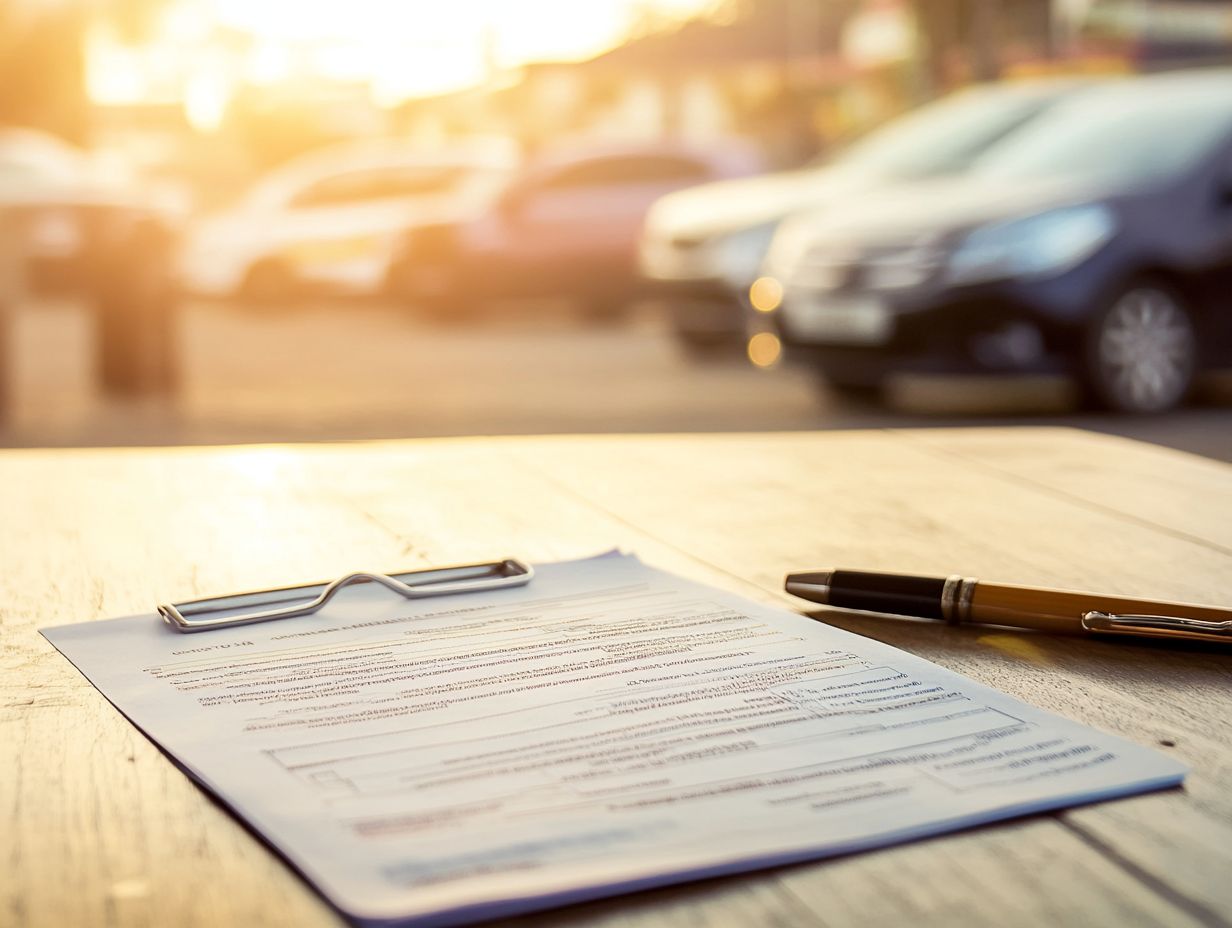
You have access to various types of vehicle history reports from trusted sources like AutoCheck and PrivateAuto. These reports offer crucial information through VIN (Vehicle Identification Number) checks, helping you avoid dealer fraud and assess your insurance needs accurately.
These reports include essential details such as previous ownership records, accident history, service maintenance logs, and title statuses. This information allows for a thorough evaluation of the vehicle’s past.
Some reports may focus mainly on accidents, while others reveal potential odometer rollbacks or flood damage. This information can be invaluable for your purchasing decision.
By using these comprehensive reports, you shield yourself from unexpected expenses and make informed choices. Ultimately, you gain greater confidence in your investment.
How Can One Verify the Authenticity of the Documents?
Verifying the authenticity of documents like the vehicle title and bill of sale is crucial for a secure transaction. Use resources like the Minnesota Department of Vehicle Services (DVS) to confirm important details, such as odometer disclosures and ownership records.
In addition to these measures, consider leveraging online platforms for document verification. These resources provide access to third-party reviews and databases that track vehicle histories, enhancing your confidence as a buyer.
Reaching out to state departments to validate the paperwork is another essential step. This helps uncover any potential liens or legal issues associated with the vehicle.
Look for consistency in the reported information, such as matching names and addresses across documents. This practice helps you identify discrepancies that may raise red flags.
Prioritizing transaction security safeguards your financial investments and nurtures a trustworthy exchange between you and the seller.
What Should Be Included in the Bill of Sale?
A comprehensive bill of sale should include essential details like vehicle registration information, payment methods, the agreed-upon sales price, and any applicable sales tax. This ensures clarity in the car purchase agreement, protecting both you and the other party involved.
In addition to these components, include the names and addresses of both the buyer and seller, along with their signatures to legally authenticate the transaction.
Including the vehicle’s identification number (VIN) is essential for accurate identification of the asset being sold, eliminating potential disputes.
Clearly outline the terms of sale, including any warranties or conditions related to the vehicle’s state. This further safeguards both parties from future misunderstandings.
By incorporating all these elements, you foster transparency and establish a robust legal foundation, ensuring a secure and seamless transaction.
Why Is It Important to Transfer the Title?
Transferring the title is a crucial step in purchasing a vehicle, as it legally signifies the change of ownership. This ensures compliance with regulations set by entities like the Minnesota DVS and provides transaction security for both you and the seller.
This process requires filling out the necessary paperwork, presenting proof of your identity, and sometimes paying applicable transfer fees. It s essential to obtain the signed title from the previous owner; skipping this step could lead to ownership disputes later on.
Failing to initiate the title transfer may create registration issues, leaving you unable to operate your new vehicle legally. Therefore, adhering to the transfer process is critical in protecting your interests and establishing clear ownership from the beginning.
Frequently Asked Questions
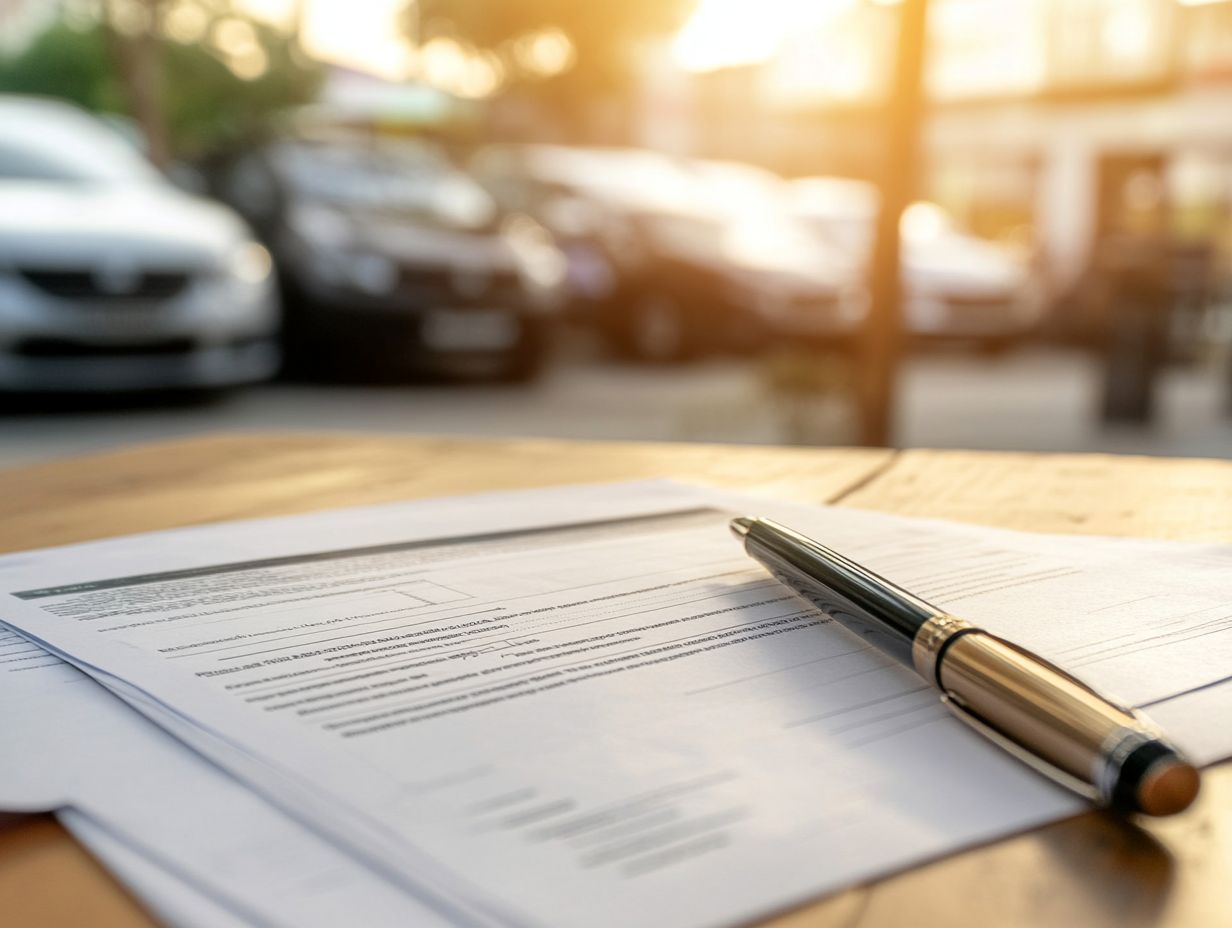
What Are the 5 Must-Have Documents for Buying Used Cars?
The five must-have documents for buying used cars are the vehicle title, registration certificate, vehicle history report, emissions test certificate, and seller’s disclosure statement.
Why do I need the vehicle title when buying a used car?
The vehicle title proves ownership. It is essential for transferring the car to your name.
What is a registration certificate and why is it important?
A registration certificate lists the owner’s name, address, and vehicle details. This document verifies the car’s current registration status and ensures it isn’t stolen.
Is a vehicle history report necessary when buying a used car?
Yes, a vehicle history report gives insight into the car’s past. It includes accidents, title changes, and maintenance records, helping you assess the vehicle’s condition.
What is an emission test certificate?
An emission test certificate shows that the car meets required environmental standards. This document affects the vehicle’s value and registration fees.
What is a seller’s disclosure statement and why do I need it?
A seller’s disclosure statement outlines any known issues with the vehicle. This protects you from buying a car with hidden problems and can be vital in legal disputes.

